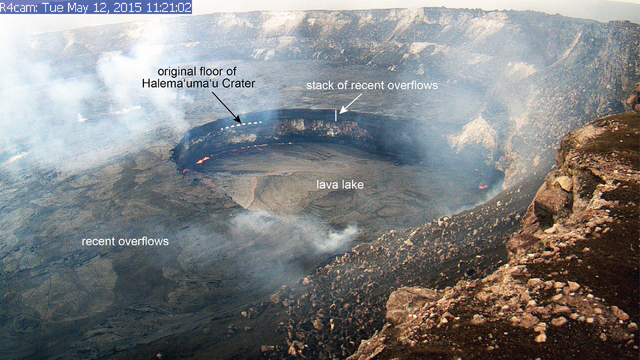The surface of the lava lake atop Kilauea once again has dropped out of sight.
On Tuesday, 19 days after first showing itself, the lake reached a level far enough below the floor of Halema‘uma‘u Crater that it could not be seen from Hawaii Volcanoes National Park’s Jaggar Museum.
“There is no lava visible from Jaggar,” Jessica Ferracane, spokeswoman for the park, said Tuesday afternoon. “I was just out there to double-check and see with my own eyeballs.”
Still, Ferracane said the crater is a sight worth seeing.
“It looks pretty cool. The vent itself is super steep, and it looks larger than it was, and lots of people are still up there. And I bet the glow up there tonight is going to be amazing,” she said.
Since Saturday, geologists have reported continued deflation of the volcano’s summit.
Janet Babb, a geologist and spokeswoman for the USGS Hawaiian Volcano Observatory, said the deflation resulted in the lake dropping approximately 13 meters (42.6 feet) since Monday morning. By Tuesday morning, it was 15 meters (50 feet) below the pre-overflow rim of the summit vent — the original floor of Halema‘uma‘u Crater.
After coming into view April 23, the lake continued to rise, eventually reaching the vent rim and overflowing onto the floor of Halema‘uma‘u — the first time molten rock had oozed onto the crater floor since 1982. During the past three weeks, the spectacle has drawn thousands of visitors to the park.
Geologists said Tuesday the dropping lava level has allowed lava veneer on the walls of the vent to fall away, exposing the contact between the original rim of the vent and the layers of recent lava overflows.
These overflows are roughly 8 meters (26 feet) thick. And not counting the 8-acre lava lake itself, the overflows total about 28 acres of Halema‘uma‘u Crater’s 138-acre floor, according to HVO.
Seismicity remains elevated beneath Kilauea’s summit and upper East and Southwest Rift Zones.
Email Chris D’Angelo at cdangelo@hawaiitribune-herald.com.






